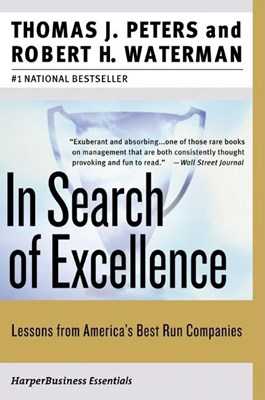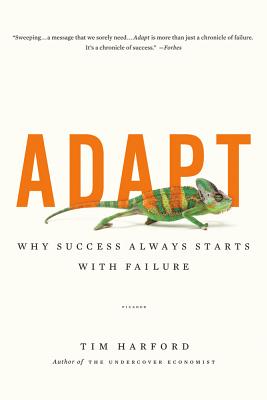Read and Adapt
May 23, 2011
We last covered Tim Harford here when Random House released his last book, The logic of Life, which we reviewed as a Jack Covert Selects. But you may have heard his name more recently because of the press that his new book, Adapt: Why Success Always Starts with Failure, has been getting. There was an excerpt on Slate last week entitled The Airplane That Saved the World: What the RAF's World War II Spitfire Can Teach Us About Nurturing Innovation and Radical Ideas.
- There was an excerpt on Slate last week entitled The Airplane That Saved the World: What the RAF's World War II Spitfire Can Teach Us About Nurturing Innovation and Radical Ideas.
- He had an article in last Sunday's New York Times Magazine about The Art of Economic Complexity: A New Way To Visualize a Country's Development that includes fascinating charts developed by Csar A. Hidalgo of the M.I.T. Media Lab that map "the world's 'product space' using trade data on 774 product classifications, from cotton undergarments to phenols."
- And popular blogger Andrew Sullivan linked to Andrew Exum's more obscure counterinsurgency blog Abu Muqawama at the Center for American Security website to explain the "reason we have some of [the] special operations capabilities" that finally got Osama Bin Laden.
The book deserves the attention and praise it's getting. It begins by covering ground a few other books have recently covered, laying out the evidence that expert predictions are not very good (though he doesn't go as far as Dan Gardner's Future Babble, which tells us that "Expert Predictions Are Worthless, and You Can Do Better"). But, documenting how expert advice and predictions are little better than our own is just the starting point of the book, and for a different approach. Adapt is mostly about solutions—solutions he demonstrates are best found through a trial and error process. He states it rather simply:
Whether we like it or not, trial and error is a tremendously powerful process for solving problems in a complex world, while expert leadership is not.This can be a rather uncomfortable pill to swallow. Most of us are currently operating contrary to that concept, for not only are we uneasy with the "error" side of trial and error, we tend to look to business success stories and so-called experts for advice and guidance. Often, the best marketing a book can have is the success or expertise of the individual who wrote it—at the very least, it is lessons we feel can be gained from the success of the companies profiled. Writing of In Search of Excellence, the book that really kick-started the modern business book genre as we know it, Harford demonstrates how tricky that can be:
In 1982 ... two management consultants, Tom Peters and Robert Waterman, concluded their own detailed study of business. In Search of Excellence was published to great acclaim and launched Peters's career as one of the world's most recognizable management gurus.The two authors, working with their colleagues at McKinsey, used a mixture of data and subjective judgement to settle on a list of forty-three "excellent" companies, which they then studied intensely in a bid to unlock their secrets.
Just two years later, Business Week ran a cover story entitled "Oops! Who's Excellent Now?" Out of the forty-three companies, fourteen, almost a third, were in serious financial trouble. Excellence—if that was what Peters and Waterman really found when they studied the likes of Atari and Wang Laboratories—appears to be a fleeting quality. Perhaps fittingly, Business Week has since had its own serious financial trouble. Let's go back even further, though—not just to the beginning of the business book genre, but to the invention of the modern book itself:
The printing press was invented by Johannes Gutenberg, a man who changed the world utterly, and produced the celebrated Gutenberg Bible in 1455. But the Gutenberg Bible was a ruinous project that put him out of business. The center of the printing industry quickly moved to Venice, where twelve companies were established by 1649. Nine of them were gone in just three years, as the industry fumbled for a profitable business model. (It eventually found one: printing pre-packaged relief from divine punishment in the form of religious indulgences.)So not every great idea turns out a great product, excellent companies aren't often excellent for long and all empires fall. To reinforce the fleeting nature of excellence, Harford tells the story of what Leslie Hannah found when, in the late '90s, she traced the fate of what had been the world's largest companies in 1912.
At the top of the list was US Steel, a gigantic corporation even by today's standards, employing 221,000 workers. This was a company with everything going for it: it was a market leader in the largest and most dynamic economy in the world; and it was in an industry that has been of tremendous importance ever since. Yet US Steel had disappeared from the world's top hundred companies by 1995; at the time of writing, it was not even in the top five hundred.
Next on the list was Jersey Standard, which these days continues to prosper under the name Exxon. General Electric and Shell were also in the top ten in 1912 an in 1995. But none of the other top-ten titans was in the top ten by 1995. More remarkably, none of them was even in the top hundred. Names such as Pullman and Singer recall a bygone age. Others, such as J&P Coats, Anaconda and International Harvester, are barely recognizable. It is hard to imagine just how large and powerful these companies once were—the closest parallels would be the likes of Microsoft and Wal-Mart today—and how permanent their success must have seemed. And while it could be said that Pullman and Singer suffered from being market leaders in declining industries, their fate was not inevitable. Singer made sewing machines, but Toyota's origins as a manufacturer of looms were no more promising. Other former titans, such as Westinghouse Electric, Cudahy Packing and American Brands, were in the same dynamic industries as the rare success stories General Electric and Proctor & Gamble. Yet they failed. As Harford demonstrates with great skill and storytelling throughout the book, it comes down to trial and error and figuring out what works and what doesn't as you attempt to develop your own gravity, attract talented people and loyal customers, and affect the forces of the market moving around you. And just because your excellent now doesn't mean you will be forever. It doesn't matter whether you're a local restaurant owner, General Motors, NASA, or the inventor of movable type—you have to keep finding ways to adapt. But how do we decide what to try next? We need a constant influx of ideas, information and inspiration, to look at what others have done and are doing around us. And, regardless of the fate of the companies in In Search of Excellence, business books provide that. In Search of Excellence provides that. Tim Harford's Adapt provides that, and if you'd like to take a lesson from Harford and implement a trial and error process in your organization, Peter Sims's Little Bets provides that. You could even say the Gutenberg Bible provides that. Just keep reading. Reading leads to more reading. Reading leaves you hungry. Reading leads to the ideas, information and inspiration you need to try something new.




